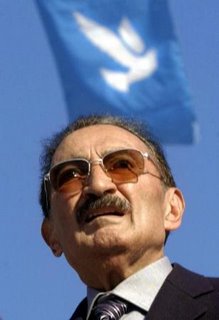 The reality of next year's presidential election is that Mr Baykal's party is going to be decoration regardless of who is on the ballot paper. The governing AK party has an overwhelming presence in parliament, just a handful of seats short of the two-thirds majority needed to elect a president in the first two rounds. Even that isn't much of a problem: the rules dictate that if there is no clear winner after the second round, the winning threshold is dropped to a simple majority for the next ballot. That's 276 votes, which the AK party can supply comfortably.
The reality of next year's presidential election is that Mr Baykal's party is going to be decoration regardless of who is on the ballot paper. The governing AK party has an overwhelming presence in parliament, just a handful of seats short of the two-thirds majority needed to elect a president in the first two rounds. Even that isn't much of a problem: the rules dictate that if there is no clear winner after the second round, the winning threshold is dropped to a simple majority for the next ballot. That's 276 votes, which the AK party can supply comfortably.With the mathematics beyond dispute, it really isn't a question of whether the AK party will win, but rather with whom. Prime ministers have certainly become presidents before - look no further than Turgut Özal and Süleyman Demirel - which suggests Recep Tayyip Erdoğan is the most obvious candidate. But it does not necessarily mean he is the right candidate.
Turgut Özal was a remarkable prime minister. He was not a remarkable president. Visibly frustrated by his former party's defeat in the 1991 general election, he never bridged the gap with the victors, the party of longtime rival Süleyman Demirel. Before his untimely death, Özal had a firm vision of what direction Turkey should take forward. It was a vision suited to a prime minister, a man accountable to the general public, but not to a president who serves only as a final check on parliament.
For all his faults - and there are many - Mr Erdoğan too is a competent politician. He has done more to encourage reform, challenge state taboos and raise living standards than any other politician since Özal. But that does not mean he has the indeterminate qualities needed in a head of state. The president is a unifying figure, a statesmanlike individual who embodies all aspects of the country and represents it at home and abroad. Mr Erdoğan is no statesman. Like Özal twenty years before him, he does not have the experience. He has been in national politics for barely half a decade - again, not unlike Özal.
But brushing aside vague ideals of statesmanship, the Turkish constitution offers a far more concrete obstacle in front of Mr Erdoğan's candidacy: impartiality. "Upon election," the constitution reads, "the president must sever all ties with his party." It is one thing to tear up a membership card - like they did with Özal's Anavatan party membership - but actually severing those ties altogether is another matter. At this difficult time in Turkish politics, it will be immensely difficult for Mr Erdoğan to prove he is a Turkish president and not an AK president. And while the electorate might be happy to give him a chance, the state establishment will not.
The Turkish presidency has been ailing for decades. It is the office of a distant figure, disconnected from the public, a man who lives in a high security base in south Ankara and vetoes laws. These were problems less noticeable when the position was occupied by a prominent individual - say, a prime minister or an army chief. But when the post was taken by Ahmet Necdet Sezer, an obscure judge, the presidency was exposed as nothing short of elitist.
The way to change that is to make the president more endearing to the public, by letting the public elect him directly. Despite calls from the opposition, it is unlikely there will be a direct presidential election this time around. Far more likely is for a president to be directly elected in 2014, after Mr Sezer's successor.
In the meantime, someone must be found to become that successor. The candidate must have experience (which rules out Mr Erdoğan for now), he must be known by the public (which, it is hoped, will deter the election of another judge), and he must be liked by the public (which is Mr Baykal's come-uppance). But in these times of political polarisation, the candidate must also not be deeply infused in party politics.
It is time for both parties to nominate - and endorse - Hikmet Çetin to become Turkey's 11th president. Mr Çetin has formerly been foreign minister, deputy prime minister, CHP leader and parliament speaker. He left domestic politics to serve as NATO's highest civilian representative in Afghanistan for two terms, and returned in August of this year. He has never been endearingly close to Mr Erdoğan, but there has not been much love lost with Mr Baykal either.
Hikmet Çetin is a capable, experienced statesman, and the most suitable candidate for Turkey's next president. By nominating Mr Çetin now, Recep Tayyip Erdoğan would not only intercept Mr Baykal's cheap threats of withdrawal, but also establish himself as the man who had the opportunity to rise to the top, and decided to wait. He is not an old man, and 2014 is only seven years away.





